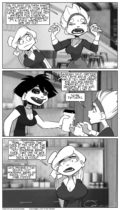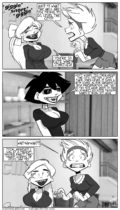So to cut to the end: as it turned out I didn't need to worry about ![[personal profile]](https://www.dreamwidth.org/img/silk/identity/user.png) bunnyhugger's finish. She would win the B Division, and handily, not just never losing a best-of-three round but only once, in finals, even needing the third game of a round. It would overstate things to say she dominated the division --- a couple of times she won in what we call ``losing the race to the bottom'' --- but a win by some nonsense counts the same as a win by playing like a pro.
bunnyhugger's finish. She would win the B Division, and handily, not just never losing a best-of-three round but only once, in finals, even needing the third game of a round. It would overstate things to say she dominated the division --- a couple of times she won in what we call ``losing the race to the bottom'' --- but a win by some nonsense counts the same as a win by playing like a pro.
Speaking of nonsense. There was one time that I, as backup tournament director, was called in to make a ruling and that was of course for a game ![[personal profile]](https://www.dreamwidth.org/img/silk/identity/user.png) bunnyhugger was playing. She and her competitor were on Godzilla, her competitor had finished ball three, and she was taking her last ball facing the uphill climb of beating the 130-or-so-million of player one. And the game just went and reset, like someone had powered it off and on again.
bunnyhugger was playing. She and her competitor were on Godzilla, her competitor had finished ball three, and she was taking her last ball facing the uphill climb of beating the 130-or-so-million of player one. And the game just went and reset, like someone had powered it off and on again.
This sort of game interruption is provided for in the rules of pinball tournaments, of course. Normally the procedure is if you can recover the scores as they stood, give a compensation ball and add that to the interrupted game's score. This is unfair if the interrupted player had been about to start, like, the Super Multiball, but what else can you do? But, in this case, the game had reset weirdly enough that it didn't preserve any of the scores, as though it forgot it had been in the middle of a game when it took a quick nap.
My inclination was that since everyone agreed the opponent had about 130 million points, give or take, let ![[personal profile]](https://www.dreamwidth.org/img/silk/identity/user.png) bunnyhugger play a whole game --- since nobody knew just what her score was, the game's screen somehow not being big enough for an always-on score display --- but I don't like making that the official ruling until I can back it up with the in-print rules. And I found that the actual printed rules we had were more specific; in the event of a catastrophic malfunction (the term of art here) all players are to replay. (If the game catastrophically malfunctions again it's kicked out of the tournament and a new game gets drawn.) So ---
bunnyhugger play a whole game --- since nobody knew just what her score was, the game's screen somehow not being big enough for an always-on score display --- but I don't like making that the official ruling until I can back it up with the in-print rules. And I found that the actual printed rules we had were more specific; in the event of a catastrophic malfunction (the term of art here) all players are to replay. (If the game catastrophically malfunctions again it's kicked out of the tournament and a new game gets drawn.) So --- ![[personal profile]](https://www.dreamwidth.org/img/silk/identity/user.png) bunnyhugger's opponent a bit disappointed to lose a decent score against a tough competitor --- they replayed.
bunnyhugger's opponent a bit disappointed to lose a decent score against a tough competitor --- they replayed.
This turned out as well as we could have hoped. ![[personal profile]](https://www.dreamwidth.org/img/silk/identity/user.png) bunnyhugger's opponent had a better game than she'd had the first time around, so could not feel cheated of a decent score she'd already completed. But
bunnyhugger's opponent had a better game than she'd had the first time around, so could not feel cheated of a decent score she'd already completed. But ![[personal profile]](https://www.dreamwidth.org/img/silk/identity/user.png) bunnyhugger had an even better score yet, taking a win and going on to the semifinals as cleanly as possible.
bunnyhugger had an even better score yet, taking a win and going on to the semifinals as cleanly as possible.
Fortunately that was the only ruling I had to make all night, as ![[personal profile]](https://www.dreamwidth.org/img/silk/identity/user.png) bunnyhugger, not being directly involved in any other games, could handle the rest. And most of those amounted to ``direct where the stuck ball's to be placed'' and ``take out Teenage Mutant Ninja Turtles because it is, once again, broken''. TMNT may be an enjoyable game --- granting that nobody's figured out how to enjoy it yet --- but it keeps having issues of throwing random numbers of balls into play in the middle of tournaments.
bunnyhugger, not being directly involved in any other games, could handle the rest. And most of those amounted to ``direct where the stuck ball's to be placed'' and ``take out Teenage Mutant Ninja Turtles because it is, once again, broken''. TMNT may be an enjoyable game --- granting that nobody's figured out how to enjoy it yet --- but it keeps having issues of throwing random numbers of balls into play in the middle of tournaments.
Anyway, ![[personal profile]](https://www.dreamwidth.org/img/silk/identity/user.png) bunnyhugger won, and the second- and third-place finishers were also delighted, and we just had to worry about whether the A Division would finish by any reasonable hour.
bunnyhugger won, and the second- and third-place finishers were also delighted, and we just had to worry about whether the A Division would finish by any reasonable hour.
But now, in pictures of Le Grand Huit, I have to share ... pinball! It wasn't a surprise that pinball was there, to us, as I'd gone looking on a pinball map to see if anything might be in reachable range, but the games that were there ... well, when I saw them on the pinball map I thought, that can't be. And yet, here they were:

Williams's Riverboat Gambler and ... Class of 1812! This was a wild enough choice that we had to photograph it, and also ![[personal profile]](https://www.dreamwidth.org/img/silk/identity/user.png) bunnyhugger had to tell people on Facebonk that it was there.
bunnyhugger had to tell people on Facebonk that it was there.

Besides Riverboat Gambler and Class of 1812 they also had in this area Party Zone, which I think I've once ever seen on location, and Lethal Weapon 3 which is, eh, that's a game all right.

Class of 1812 is a wild game, though, with a definite vibe of ``we have The Addams Family license at home'' and that gruesome-humor vibe that's always fun.

![[personal profile]](https://www.dreamwidth.org/img/silk/identity/user.png) bunnyhugger had, like, three really good games in a row of it. Here she pauses to wait for her score to come back.
bunnyhugger had, like, three really good games in a row of it. Here she pauses to wait for her score to come back.

Pinball router calling cards: the universal language? Apart from the grouping of telephone digits you could slip this under the glass of a game in the United States and not really stand out.

A nice thing about Gottlieb games of the early 90s is they had this map of what was on the playfield and what you got for it. I didn't know they made it in multiple languages, though.
Trivia: The second Howard Johnson's opened in 1935, ten years after the original; by the end of the year there were 39 of them. By the end of 1939 there were 107. Source: The Big Roads: The Untold Story of the Engineers, Visionaries, and Trailblazers Who Created the American Superhighways, Earl Swift.
Currently Reading: In The Shadow Of The Moon: A Challenging Journey to Tranquility, 1965 - 1969, Francis French and Colin Burgess.
 indescribable
indescribable





 hopeful
hopeful





 accomplished
accomplished
 mellow
mellow












 sad
sad exhausted
exhausted awake
awake





 anxious
anxious











 worried
worried
























